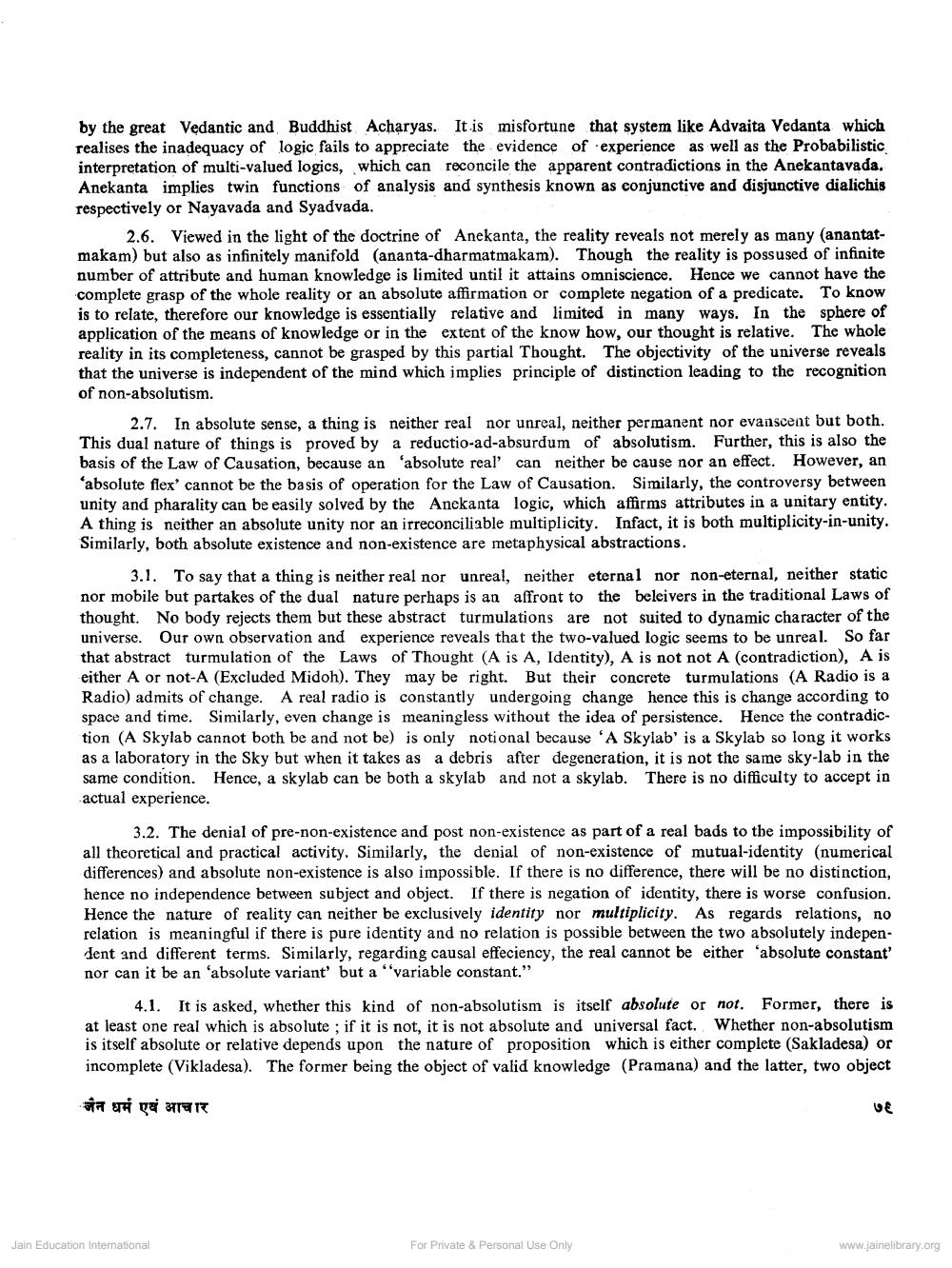Book Title: Jaina Value of Life Author(s): Ramjee Singh Publisher: Z_Deshbhushanji_Maharaj_Abhinandan_Granth_012045.pdf View full book textPage 3
________________ by the great Vedantic and Buddhist Acharyas. It is misfortune that system like Advaita Vedanta which realises the inadequacy of logic fails to appreciate the evidence of experience as well as the Probabilistic interpretation of multi-valued logics, which can reconcile the apparent contradictions in the Anekantavada. Anekanta implies twin functions of analysis and synthesis known as conjunctive and disjunctive dialichis respectively or Nayavada and Syadvada. 2.6. Viewed in the light of the doctrine of Anekanta, the reality reveals not merely as many (anantatmakam) but also as infinitely manifold (ananta-dharmatmakam). Though the reality is possused of infinite number of attribute and human knowledge is limited until it attains omniscience. Hence we cannot have the complete grasp of the whole reality or an absolute affirmation or complete negation of a predicate. To know is to relate, therefore our knowledge is essentially relative and limited in many ways. In the sphere of application of the means of knowledge or in the extent of the know how, our thought is relative. The whole reality in its completeness, cannot be grasped by this partial Thought. The objectivity of the universe reveals that the universe is independent of the mind which implies principle of distinction leading to the recognition of non-absolutism. 2.7. In absolute sense, a thing is neither real nor unreal, neither permanent nor evanscent but both. This dual nature of things is proved by a reductio-ad-absurdum of absolutism. Further, this is also the basis of the Law of Causation, because an 'absolute real' can neither be cause nor an effect. However, an 'absolute flex' cannot be the basis of operation for the Law of Causation. Similarly, the controversy between unity and pharality can be easily solved by the Anckanta logic, which affirms attributes in a unitary entity. A thing is neither an absolute unity nor an irreconciliable multiplicity. Infact, it is both multiplicity-in-unity. Similarly, both absolute existence and non-existence are metaphysical abstractions. 3.1. To say that a thing is neither real nor unreal, neither eternal nor non-eternal, neither static nor mobile but partakes of the dual nature perhaps is an affront to the beleivers in the traditional Laws of thought. No body rejects them but these abstract turmulations are not suited to dynamic character of the universe. Our own observation and experience reveals that the two-valued logic seems to be unreal. So far that abstract turmulation of the Laws of Thought (A is A, Identity), A is not not A (contradiction), A is either A or not-A (Excluded Midoh). They may be right. But their concrete turmulations (A Radio is a Radio) admits of change. A real radio is constantly undergoing change hence this is change according to space and time. Similarly, even change is meaningless without the idea of persistence. Hence the contradiction (A Skylab cannot both be and not be) is only notional because 'A Skylab' is a Skylab so long it works as a laboratory in the Sky but when it takes as a debris after degeneration, it is not the same sky-lab in the same condition. Hence, a skylab can be both a skylab and not a skylab. There is no difficulty to accept in actual experience. 3.2. The denial of pre-non-existence and post non-existence as part of a real bads to the impossibility of all theoretical and practical activity. Similarly, the denial of non-existence of mutual-identity (numerical differences) and absolute non-existence is also impossible. If there is no difference, there will be no distinction, hence no independence between subject and object. If there is negation of identity, there is worse confusion. Hence the nature of reality can neither be exclusively identity nor multiplicity. As regards relations, no relation is meaningful if there is pure identity and no relation is possible between the two absolutely independent and different terms. Similarly, regarding causal effeciency, the real cannot be either 'absolute constant' nor can it be an 'absolute variant' but a "variable constant." 4.1. It is asked, whether this kind of non-absolutism is itself absolute or not. Former, there is at least one real which is absolute; if it is not, it is not absolute and universal fact. Whether non-absolutism is itself absolute or relative depends upon the nature of proposition which is either complete (Sakladesa) or incomplete (Vikladesa). The former being the object of valid knowledge (Pramana) and the latter, two object - जैन धर्म एवं आचार Jain Education International For Private & Personal Use Only ७६ www.jainelibrary.orgPage Navigation
1 2 3 4
